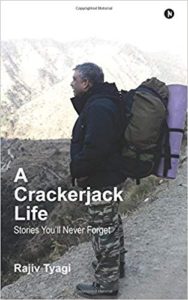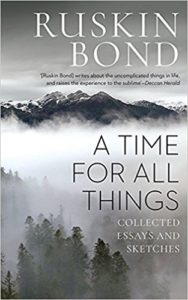“A Crackerjack Life” by Rajiv Tyagi
 Ex-fighter pilot of the Indian Air Force (IAF) Rajiv Tyagi has built a formidable reputation on social media for his forthright opinions on contemporary politics. Apart from his posts being very informative, his is an influential and sane voice on social media where fake news goes viral rapidly. It is no wonder then that he has accrued more than 50,000 followers on Facebook alone.
Ex-fighter pilot of the Indian Air Force (IAF) Rajiv Tyagi has built a formidable reputation on social media for his forthright opinions on contemporary politics. Apart from his posts being very informative, his is an influential and sane voice on social media where fake news goes viral rapidly. It is no wonder then that he has accrued more than 50,000 followers on Facebook alone.
Recently he published a collection of essays/stories that recalled incidents from his experience as an Air Force Officer and more. A Crackerjack Life is a memoir with a difference as it is not a straightforward narrative but a series of short pieces strung together, more or less chronologically, to chart the fascinating life Rajiv Tyagi has led. From being a little child who was travelling alone from Indonesia to his grandparents in Meerut so that he could then be sent on to boarding school in Mussorie, his passion for high altitude trekking, to later his absolutely fascinating accounts of serving in the IAF in various border postings, witnessing some incredible encounters that if he had not seen for himself would be relegated to modern myth making such as the convoys of Red Army and Blue Army suddenly finding themselves in together rather than on opposite sides but no one dared say or do anything but quietly parted ways. There are many more incidents some very personal and heartwarming such as the one about his classmate Virender whose leg had to be amputated after being diagnosed with cancer and how he was received by his classmates at school. Having said that the stories and experiences shared do to a large extent quell the annoying presence of editing mistakes but not necessarily overcome it. Perhaps the next edition of the book will be better edited. For now the brisk sales of this book since its release a few weeks ago are a testimony to Rajiv Tyagi’s passionate storytelling with a great eye for detail.
A Crackerjack Life is a delightful collection of memorably evocative stories. The stories are significant too for highlighting the richly diverse, secular, tolerant and democratic space that was newly independent India and hopefully will forever be.
With the author’s permission the following extract from the book is being published here.
****
PERSUASION
Thanks to an egalitarian, agnostic father and the Armed Forces, I did not know what a gotra was, till I reached my late twenties. Hindus assert that every single one of them, Chitra, Pappu and Manoj, are descended from an ascetic saint. My paternal line is said to descend from a Rishi Gautam. My gotra therefore is Gautam.
My father did his schooling in the Gurukul Kangri school and then college, in Hardwar in the 1940s. They wore dhotis and langot, spoke Sanskrit fluently, and wore wooden khadaaon (wooden slippers) on their feet. The day began at 4 AM, with a swim in the Ganga canal outside the college, followed with a bath, change and havan (Hindu congregational prayer), before breakfast and classes. Except for the discipline, which he maintained for himself all his life, despite failing miserably to instil any of it in his children, he found little to commend for his life in the Gurukul. For when he reached Germany to study Medicine at Munich University in 1950, he found his knowledge of Science and the world around him severely lacking in comparison to other students who had studied in Germany or in Anglo Indian schools in India. His edge over others, in conversational Sanskrit and his facility at reciting Vedic shlokas from memory, he found useful only as curiosities. He had to work extra hours to catch up on what he had missed of human knowledge, while he was learning what turned out to be mere trivia, useful only to regale the Sanskrit and Vedic illiterate.
A strapping, tall, athletic and handsome man, he exuded, on his occasional outings in churidaar-achkan and turban, the aura of an Oriental prince. He and his friends cultivated the image to the hilt, telling their German friends how shocked they were to see a poor nation like theirs, where everyone re-used crockery instead of throwing it away after use. The suggestion from a fellow Indian student, that they might be exaggerating just a wee bit, was met with the query how he would describe a ‘mitti ka shakora’! And if that would not constitute Indian crockery? And did he in his home, wash a shakora to re-use it?
He lived as a paying guest, in a room rented from a widow he called Mutter (Mother), dining with the family at their table; the family comprising his land lady and a pretty daughter, who Mutter was eager to marry off to this young man who would soon be Herr Doktor.
After graduating, on Mutter’s suggestion that he convert to Christianity, Herr Doktor escaped from pretty daughter and Germany, learned Italian while interning in a hospital in Italy, befriended some Catholic priests, who taught him enough Latin to show off to other Europeans and made his way back by ship to India, taking up his first job as a resident, at the Bhowali Sanatorium, in what is now Uttarakhand.
My Mother, Sharmaji ki chhoti beti (the younger daughter of Mr. Sharma), then an 18 year old beauty with impossibly thick tresses woven into two plaits, lived a few lanes away from my grand parents’ home in Meerut. It was a match made in heaven, said the astrologers from both families. Whereupon my father was summoned by means of telegram, to hurry home forthwith, as he was to be married to a girl they had chosen for him.
In my grand parents’ home, food was dropped from a height into the outstretched palms of the woman who came to clean the toilets and who they called the bhangan. In my parents’ home, infused with the liberal egalitarianism of a Western culture, the driver and maids used the same crockery and cutlery as we did. This dichotomy did not escape me, though I did not question it. My mother would tell us stories in Hindi, from the Ramayan and my father from the Mahabharat, interspersed now and then with long passages in Sanskrit, from some obscure version of the grand epic. But at no time do I remember being taught to pray, even though my Mother was a practising Hindu and a temple goer. She did tell us which god was which and how to recognize them.
My connect with prayer came only after I was admitted to a Catholic boarding school run by nuns in Mussoorie, in Class 2. Visits to the chapel and the whole atmosphere of religiosity were annoying to me. This improved when I moved to St. George’s College, inasmuch as there was never an air of religiosity within its environment. By Class 4, I had found a treasure trove of Greek mythology in the school library, along with some fascinating books for children, on magnetism and electricity. I consumed them voraciously, some even during Miss Dhillon’s classes! Sometime towards the end of Class 5, after a heavy diet of Greek mythology, magnetism and electricity, I experienced an epiphany – that religions are a collective and organized scam, propagated through stories that were pure fairy tales and fantasy. That was the beginning of my life as a rationalist, a humanist and an atheist.
To buy the book: Paperback and Kindle
13 July 2018







